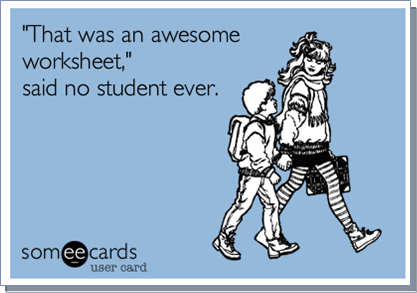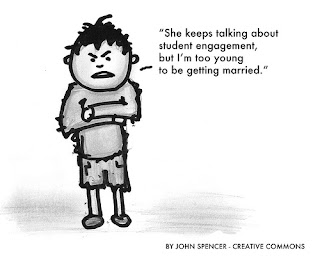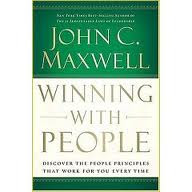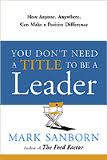1. Don't just care...really care!
It is so easy to get wrapped up in our own little worlds, but we have got to remember that whatever is going on in our world, is 100 times simpler and less complicated than that of our students. If a student is having a bad day, or if a student is having a great day, give them the opportunity to tell you about it. Be interested and actually listen to their stories, because if you can show the students you care, they will trust you, and when they trust you, magical things can happen in an educational setting. Take an interest in their music, their hobbies, their triumphs and struggles, and use that information to help them. IF THE STUDENTS DON'T THINK YOU CARE, YOU WILL NEVER MAKE A MEANINGFUL CONNECTION WITH THEM!!
2. Speak to every student at least once every class period - the more the better!
Try very hard to make sure this is common practice in your classroom. Even if it is a simple "hello" or "how are you doing?" it can mean a ton to the student. Additionally, making that early connection in the class period allows that student to feel more comfortable, which as we all know, students must be comfortable for learning to take place. STUDENTS DON'T LEARN WHEN THEY ARE STRESSED AND UNCOMFORTABLE!!
3. Meet your students where they are; not where they are supposed to be, or where you want them to be...
This strategy can be really difficult, but if you can master it, it can pay huge dividends in the long run. Every year you start with new students, with different ability levels, different learning styles, and different attitudes toward education. We have to meet each student on their level. Their level means their ability, their learning style, and their attitude toward education. If we treat every student the same, we CANNOT expect the same results! Just as a doctor evaluates all of a patient's symptoms and treats the patient accordingly, we must evaluate each student and approach the learning process in a manner which is best suited for that individual student. FORGET ABOUT USING ONE STRATEGY TO TEACH ALL OF YOUR STUDENTS!!
4. Have high expectations, and expect the best from every single student every single day!
This is probably one of the toughest in terms of increasing student engagement. I have found that when you push the students and they know you are pushing them, they engage themselves and respond at a much higher level than if you were giving them review work over and over. Human nature is to enjoy a challenge and a task that requires more than the minimum. If your students are disengaged and non-attentive, perhaps they are bored, and they need a challenge to get them going. Let your students know you have high expectations for yourself, and consequently you expect the best from them too. NEVER UNDERESTIMATE THE POWER OF A CHALLENGE WHEN IT COMES TO STUDENT ENGAGEMENT!!
5. Do whatever it takes to get your students out of their desks, and give them every opportunity to be actively moving !
Organized chaos is how we should describe our classrooms. Students need to move, and sitting for 7 hours a day is frankly torture. Would you want to sit for 7 hours a day and listen to people talk at you...no, I think not. Try to get your students up and moving every single day. I am talking about relay races, group work, activities that require building things with their hands, an activity where unused fly swatters are used, and lastly skits and reenactments that make everybody laugh. THE HUMAN BODY WAS NOT DESIGNED TO SIT ALL DAY!!
6. Focus on the three R's - rigor, relationships, and relevance...
I already talked about rigor (4) and relationships (1), but I wanted to keep all three Rs together. If the students see no relevance and value in education, then how can we expect them to learn? We have got to make sure what they are doing in school is practical and relevant, because if we don't we have no shot at engaging them. Show students the connections to what they are learning and the world in which they live. Also, use resources to make what they are learning applicable in their current lives, and show them ways to use what they've learned in class. IF THEY SEE NO VALUE, THEY WILL NEVER BE TRULY ENGAGED!!
7. Most importantly...give your students a voice and involve them in the educational process!
Unfortunately, this is one of the most difficult things to do in an educational setting, and because it is one of the most difficult, it is one of the most important. The students know how they learn, they know what they like and dislike, and they hold the key to getting them interested and engaged. Every day is an opportunity to learn from your students how to do your job more effectively and efficiently. Students are a free resource that most educators ignore. Include them in making assignments, teaching lessons, designing rubrics and designing assessments. What do you have to lose? They will provide you with a wealth of knowledge, and most importantly, they will be engaged because they are a part of the process. They now have a voice in how they are educated, as well as how they are assessed...STUDENT INVOLVEMENT = AWESOME!!
Please respond with any additional strategies you use to engage your students. I would love to add to this list and compile a much larger list to use with new and experienced teachers, as well as teacher growth and development programs. Thank you in advance for your help!
It is so easy to get wrapped up in our own little worlds, but we have got to remember that whatever is going on in our world, is 100 times simpler and less complicated than that of our students. If a student is having a bad day, or if a student is having a great day, give them the opportunity to tell you about it. Be interested and actually listen to their stories, because if you can show the students you care, they will trust you, and when they trust you, magical things can happen in an educational setting. Take an interest in their music, their hobbies, their triumphs and struggles, and use that information to help them. IF THE STUDENTS DON'T THINK YOU CARE, YOU WILL NEVER MAKE A MEANINGFUL CONNECTION WITH THEM!!
2. Speak to every student at least once every class period - the more the better!
Try very hard to make sure this is common practice in your classroom. Even if it is a simple "hello" or "how are you doing?" it can mean a ton to the student. Additionally, making that early connection in the class period allows that student to feel more comfortable, which as we all know, students must be comfortable for learning to take place. STUDENTS DON'T LEARN WHEN THEY ARE STRESSED AND UNCOMFORTABLE!!
3. Meet your students where they are; not where they are supposed to be, or where you want them to be...
This strategy can be really difficult, but if you can master it, it can pay huge dividends in the long run. Every year you start with new students, with different ability levels, different learning styles, and different attitudes toward education. We have to meet each student on their level. Their level means their ability, their learning style, and their attitude toward education. If we treat every student the same, we CANNOT expect the same results! Just as a doctor evaluates all of a patient's symptoms and treats the patient accordingly, we must evaluate each student and approach the learning process in a manner which is best suited for that individual student. FORGET ABOUT USING ONE STRATEGY TO TEACH ALL OF YOUR STUDENTS!!
4. Have high expectations, and expect the best from every single student every single day!
This is probably one of the toughest in terms of increasing student engagement. I have found that when you push the students and they know you are pushing them, they engage themselves and respond at a much higher level than if you were giving them review work over and over. Human nature is to enjoy a challenge and a task that requires more than the minimum. If your students are disengaged and non-attentive, perhaps they are bored, and they need a challenge to get them going. Let your students know you have high expectations for yourself, and consequently you expect the best from them too. NEVER UNDERESTIMATE THE POWER OF A CHALLENGE WHEN IT COMES TO STUDENT ENGAGEMENT!!
5. Do whatever it takes to get your students out of their desks, and give them every opportunity to be actively moving !
Organized chaos is how we should describe our classrooms. Students need to move, and sitting for 7 hours a day is frankly torture. Would you want to sit for 7 hours a day and listen to people talk at you...no, I think not. Try to get your students up and moving every single day. I am talking about relay races, group work, activities that require building things with their hands, an activity where unused fly swatters are used, and lastly skits and reenactments that make everybody laugh. THE HUMAN BODY WAS NOT DESIGNED TO SIT ALL DAY!!
6. Focus on the three R's - rigor, relationships, and relevance...
I already talked about rigor (4) and relationships (1), but I wanted to keep all three Rs together. If the students see no relevance and value in education, then how can we expect them to learn? We have got to make sure what they are doing in school is practical and relevant, because if we don't we have no shot at engaging them. Show students the connections to what they are learning and the world in which they live. Also, use resources to make what they are learning applicable in their current lives, and show them ways to use what they've learned in class. IF THEY SEE NO VALUE, THEY WILL NEVER BE TRULY ENGAGED!!
7. Most importantly...give your students a voice and involve them in the educational process!
Unfortunately, this is one of the most difficult things to do in an educational setting, and because it is one of the most difficult, it is one of the most important. The students know how they learn, they know what they like and dislike, and they hold the key to getting them interested and engaged. Every day is an opportunity to learn from your students how to do your job more effectively and efficiently. Students are a free resource that most educators ignore. Include them in making assignments, teaching lessons, designing rubrics and designing assessments. What do you have to lose? They will provide you with a wealth of knowledge, and most importantly, they will be engaged because they are a part of the process. They now have a voice in how they are educated, as well as how they are assessed...STUDENT INVOLVEMENT = AWESOME!!
Please respond with any additional strategies you use to engage your students. I would love to add to this list and compile a much larger list to use with new and experienced teachers, as well as teacher growth and development programs. Thank you in advance for your help!










